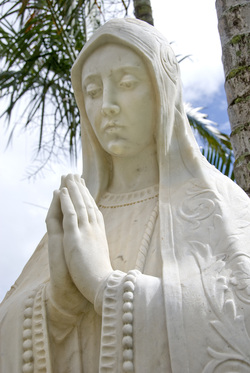Anointing the Sick
|
Continuing the healing ministry of Christ in the world today, the Church takes special care for those who are sick. Members of the parish community of Sts Peter and Paul are encouraged to visit the sick and pray with them. In particular, parish ministers visit the sick and the aged to bring them holy communion. This is a sacramental sign of unity with Christ and the Church for those who are unable to take part in the Sunday Mass.
The Church also has a special sacrament for those who are seriously ill in which the sick person is anointed with oil. Note, it is celebrated for those who are sick – the Church cannot anoint someone who has died and it is not a last rite of commendation for the dying. Someone may be anointed before surgery, elderly people may be anointed on account of the weakness of age, sick children may be anointed, and the sacrament may be repeated if the illness becomes more serious. When a person begins to be in danger of death, they should already have been anointed. The minister of anointing is the priest who acts in the name of Christ and the Church. As a sacrament, anointing gives the sick person God’s grace to cope with suffering and brings to bear the ministry of the whole Church in love and care. By the grace of the Holy Spirit, the whole person is helped and saved, sustained by trust in God and strengthened. Thus the sick person is able not only to bear suffering bravely but also to fight against it. The sacrament forgives sin and, in the context of saving and raising up the sick person, physical health may also be restored. At Sts Peter and Paul, a communal anointing is organised several times a year in the church. Those who are sick, aged or frail are brought to the church for this rite which is followed by a friendly ‘cuppa’ in the hall. This is an excellent context for the rite because it affirms the connection of a person isolated through ill health with the whole community. In individual cases, parishioners are invited to contact the parish office so that the priest can visit and celebrate the sacrament with the sick person and their family. |

